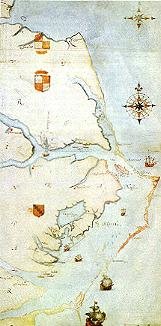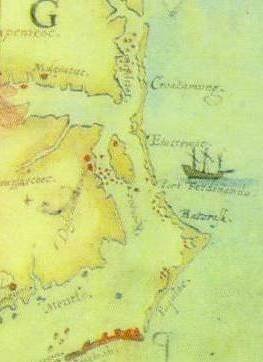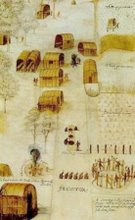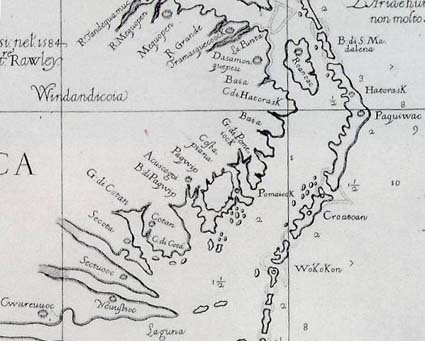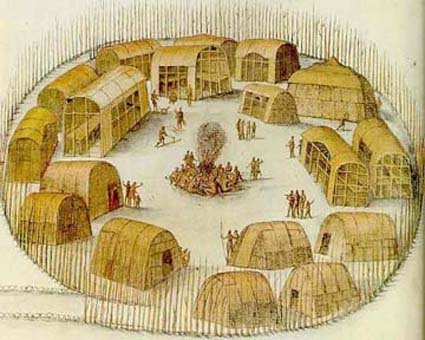Yet Edward Teach, alias Blackbeard, has never been more popular on the Crystal Coast and Outer Banks of North Carolina. His personal flag, a demon with hourglass and a spear piercing a crimson heart, flutters from many homes and shops. Blackbeard is big business here, from his one-time home at Bath, to Beaufort Inlet where his Queen Anne's Revenge is now being salvaged, to Ocracoke, where he met a violent end. There is everything from a beer to a rock band named for the world's most famous pirate, whose glory days covered 1717-18.
Cont. here:
Saturday, September 3, 2011
Blackbeard's Revenge
Posted by
Historical Melungeons
at
9/03/2011 11:50:00 PM
![]()
Labels: Blackbeard, oracoke, pirate, teach
Friday, May 27, 2011
Sea Gives Up 300 Year Old Blackbeard Artifacts

This blog is © History Chasers
Click here to view all recent Lost Colony Research GroupQueen Anne's revenge, Blog posts
Posted by
Historical Melungeons
at
5/27/2011 09:00:00 PM
![]()
Labels: anchor, Blackbeard, ocean, queen anne's revenge, ships
Tuesday, May 13, 2008
The Museum of Albemarle Tells Story of Thousands of Years
Story of Albermarle Sound
Written by Bruce Ferrell
(ELIZABETH CITY) --A new signature exhibit opened at an Elizabeth City museum this weekend -- to tell the story of the Albermarle Sound over thousands of years. The 6,200 square foot "Our Story" exhibit at The Museum of the Albermarle includes more than 750 artifacts which takes visitors through time -- including the settling of the Lost Colony and when Blackbeard the Pirate roamed the seas and finally to today. Museum exhibit design chief Don Pendergraft says the centerpiece is a 1755 farmhouse. The $1.5 million project was funded from private donations.
http://www.ncnn.com/content/view/2694/26/
Posted by
Historical Melungeons
at
5/13/2008 09:40:00 PM
![]()
Labels: Albemarle, Blackbeard, lost colony, pirate
Wednesday, April 23, 2008
Historic Bath, North Carolina
Welcome to Historic Bath —North Carolina's First Town
European settlement near the Pamlico River in the 1690s led to the creation of Bath, North Carolina's first town, in 1705. The town's location seemed ideal with easy access to the river and the Atlantic Ocean 50 miles away at Ocracoke Inlet.
The first settlers were French Protestants from Virginia. Among early inhabitants were John Lawson, surveyor general of the colony and author of the first history of Carolina (1709), and Christopher Gale, first chief justice of the colony.
By 1708, Bath consisted of 12 houses and about 50 people. Trade in naval stores, furs, and tobacco was important, and Bath became the first port of entry into North Carolina. In 1707, a grist mill and the colony's first shipyard were established in the town. A library sent to St. Thomas Parish in 1701 became the first public library in the colony. The parish also established a free school for Indians and blacks.
Early Bath was disturbed by political rivalries, epidemics, Indian wars, and piracy. Cary's Rebellion (1711) was an armed struggle over religion and politics in the colony. An epidemic of yellow fever and a severe drought occurred in 1711. The Tuscarora War between the weakened settlers and the powerful Tuscarora Indians followed immediately. Bath became a refuge for the surrounding area until the Indian power was broken. Bath was also the haunt of Edward Teach, better known as the pirate "Blackbeard." An expedition of the British Navy killed him in a naval battle near Ocracoke in 1718.
Cont. Here:
http://www.nchistoricsites.org/bath/
Posted by
Historical Melungeons
at
4/23/2008 02:37:00 PM
![]()
Labels: Blackbeard, john lawson, ocracoke, Pamlico, tuscarora war


